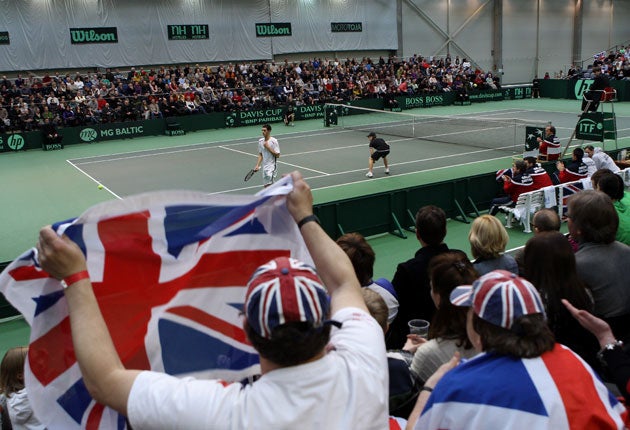Felgate: 'We're not a big tennis nation'
Britain's biggest failing is losing out to other sports in chase for young talent

Your support helps us to tell the story
From reproductive rights to climate change to Big Tech, The Independent is on the ground when the story is developing. Whether it's investigating the financials of Elon Musk's pro-Trump PAC or producing our latest documentary, 'The A Word', which shines a light on the American women fighting for reproductive rights, we know how important it is to parse out the facts from the messaging.
At such a critical moment in US history, we need reporters on the ground. Your donation allows us to keep sending journalists to speak to both sides of the story.
The Independent is trusted by Americans across the entire political spectrum. And unlike many other quality news outlets, we choose not to lock Americans out of our reporting and analysis with paywalls. We believe quality journalism should be available to everyone, paid for by those who can afford it.
Your support makes all the difference.They won the first Davis Cup 110 years ago, held the trophy from 1920 to 1926 and share the record for the most appearances in the elite World Group. They have one of the richest national federations in world tennis and host one of the four Grand Slams, yet last weekend they lost to a comparatively impoverished nation with a population one-30th the size of their own. Yes, tennis in the United States is going through a tough time.
If the Americans' loss away to Serbia was less of a national embarrassment than Britain's defeat in Lithuania, it was another reminder of the changing landscape of world tennis. It is seven years since an American man won a Grand Slam singles title – the country's longest barren run in the Open era – and nobody is on the horizon to pick up the baton from Andy Roddick.
Meanwhile, another traditional powerhouse, Australia, who compete in the Davis Cup's Asia Oceania Zone alongside Uzbekistan and the Philippines, are looking less likely to produce a male Grand Slam winner than at almost any time in their history. The only Australian in the world's top 100 other than the injury-prone Lleyton Hewitt is Peter Luczak, a 30-year-old journeyman who has never reached an ATP final.
The problems facing the old tennis nations are twofold. As well as competing with the hungry wannabes from regions such as eastern Europe, they are also losing out to other sports in their own backyards in the chase to recruit talented young athletes.
Roger Taylor, a former British Davis Cup captain, sees that every weekend during the summer in his role as director of tennis at the Wimbledon Club, just over the road from the All England Club. "On a Sunday I see a hundred boys out there playing cricket," he said. "They're all leaping, diving, catching. You think: 'Where are our tennis players?' Cricket is booming like you've never seen. There are a lot of good athletes that we just don't see in tennis."
Taylor, who was "surprised and shocked" by the defeat in Vilnius, is disappointed at the way so many promising British youngsters fail to realise their potential. "They might look good at 12 and 14, when they're improving rapidly, but at 16 and 17 the progress is smaller and at 18 and 19 there's not much improvement," he said.
"Then it's all down to match play, where you must make the right decisions on court, using your best shots. Players might have good technique, good coaches and good facilities, but you need to be able to play matches.
"In tennis you don't lose because you don't hit winners. You lose because you make mistakes in crucial moments. That's what you try to get any youngster to learn about, to learn to live with that kind of pressure."
David Felgate, Tim Henman's former coach and a former performance director at the Lawn Tennis Association, believes that Britain has "an over-inflated idea of where tennis sits" in the national sporting landscape.
"We're not that big a sport," he said. "People always point to the money that the LTA gets from Wimbledon, but it pales into insignificance compared with the money that, say, French tennis gets because of what local government does for the sport over there."
While Britain has one player in the world's top 150, France has 17 and Spain 19. "I don't think we're a big tennis nation, so our best young talents may well be going into other sports," Felgate said. "These other countries are doing better, but that's because they are bigger tennis-playing nations. Even so, having all those players doesn't guarantee success. With all the players France produce they still haven't had a Grand Slam champion since Yannick Noah."
Felgate believes the LTA's mistake is to believe that they have a major role to play in producing players, rather than concentrating on helping clubs and academies to bring talent through. "Look at the Football Association," he said. "They don't produce players. Clubs produce players. The FA just tries to help along the way. Look at golf. How often do you hear the Royal and Ancient talked about in terms of producing players? Never."
Join our commenting forum
Join thought-provoking conversations, follow other Independent readers and see their replies
Comments